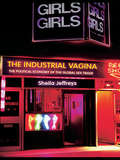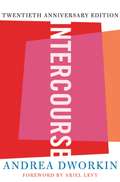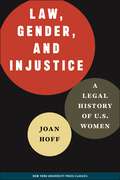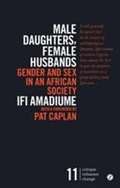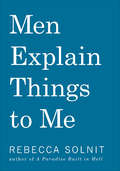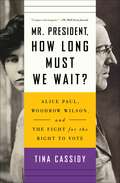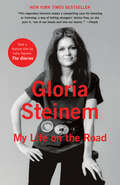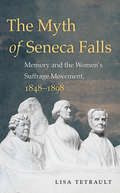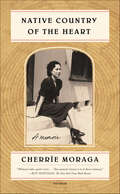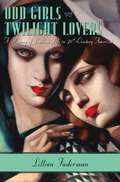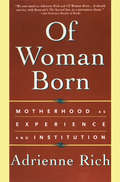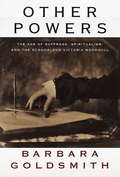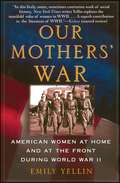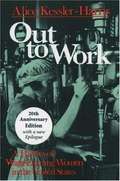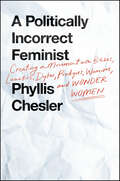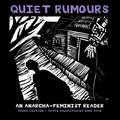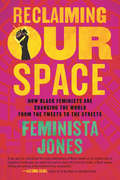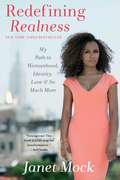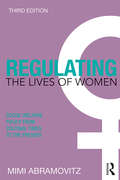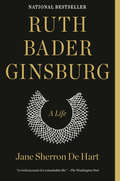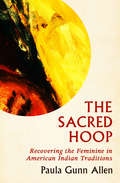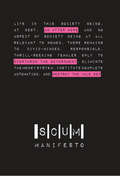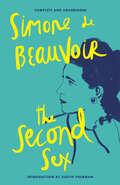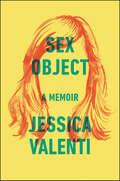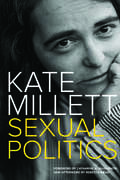Special Collections
NYPL's 2020 Essential Reads on Feminism for Adults
Description: This NYPL list includes first-hand accounts and histories of the suffrage movement that chronicle both its successes and its limitations, as well as contemporary essays on how feminism intersects with race, class, education, and LGBTQ+ activism. #adults
- Table View
- List View
The Industrial Vagina
by Sheila JeffreysThe industrialization of prostitution and the sex trade has created a multibillion-dollar global market, involving millions of women, that makes a substantial contribution to national and global economies.
The Industrial Vagina examines how prostitution and other aspects of the sex industry have moved from being small-scale, clandestine, and socially despised practices to become very profitable legitimate market sectors that are being legalised and decriminalised by governments. Sheila Jeffreys demonstrates how prostitution has been globalized through an examination of:
the growth of pornography and its new global reach
the boom in adult shops, strip clubs and escort agencies
military prostitution and sexual violence in war
marriage and the mail order bride industry
the rise in sex tourism and trafficking in women.
She argues that through these practices women’s subordination has been outsourced and that states that legalise this industry are acting as pimps, enabling male buyers in countries in which women’s equality threatens male dominance, to buy access to the bodies of women from poor countries who are paid for their sexual subservience.
This major and provocative contribution is essential reading for all with an interest in feminist, gender and critical globalisation issues as well as students and scholars of international political economy.
Intercourse
by Andrea DworkinAndrea Dworkin, once called "Feminism’s Malcolm X,” has been worshipped, reviled, criticized, and analyzed-but never ignored. The power of her writing, the passion of her ideals, and the ferocity of her intellect have spurred the arguments and activism of two generations of feminists. Now the book that she’s best known for-in which she provoked the argument that ultimately split apart the feminist movement-is being reissued for the young women and men of the twenty-first century. Intercourse enraged as many readers as it inspired when it was first published in 1987.
In it, Dworkin argues that in a male supremacist society, sex between men and women constitutes a central part of women’s subordination to men. (This argument was quickly-and falsely-simplified to "all sex is rape” in the public arena, adding fire to Dworkin’s already radical persona. ) In her introduction to this twentieth-anniversary edition of Intercourse, Ariel Levy, the author of Female Chauvinist Pigs, discusses the circumstances of Dworkin’s untimely death in the spring of 2005, and the enormous impact of her life and work. Dworkin’s argument, she points out, is the stickiest question of feminism: Can a woman fight the power when he shares her bed?
Law, Gender, and Injustice
by Joan HoffA groundbreaking analysis of how gendered oppression is written into the American legal systemLaw, Gender, and Injustice: A Legal History of U.S. Woman is a landmark study of how women remain second-class citizens under the current legal system. In this widely acclaimed book, Joan Hoff questions whether the continued pursuit of equality based on a one-size-fits-all vision of traditional individual rights is really what will most improve conditions for women in America. Concluding that equality based on liberal male ideology is no longer an adequate framework for improving women's legal status, Hoff's highly original and incisive volume calls for a demystification of legal doctrine and a reinterpretation of legal texts (including the Constitution) to create a feminist jurisprudence.
Male Daughters, Female Husbands
by Ifi AmadiumeIn 1987, more than a decade before the dawn of queer theory, Ifi Amadiume wrote Male Daughters, Female Husbands, to critical acclaim. This compelling and highly original book frees the subject position of 'husband' from its affiliation with men, and goes on to do the same for other masculine attributes, dislocating sex, gender and sexual orientation.
Boldly arguing that the notion of gender, as constructed in Western feminist discourse, did not exist in Africa before the colonial imposition of a dichotomous understanding of sexual difference, Male Daughters, Female Husbands examines the structures in African society that enabled people to achieve power, showing that roles were not rigidly masculinized nor feminized. At a time when gender and queer theory are viewed by some as being stuck in an identity-politics rut, this outstanding study not only warns against the danger of projecting a very specific, Western notion of difference onto other cultures, but calls us to question the very concept of gender itself.
Men Explain Things to Me
by Rebecca SolnitThe National Book Critics Circle Award–winning author delivers a collection of essays that serve as the perfect &“antidote to mansplaining&” (The Stranger). In her comic, scathing essay &“Men Explain Things to Me,&” Rebecca Solnit took on what often goes wrong in conversations between men and women. She wrote about men who wrongly assume they know things and wrongly assume women don&’t, about why this arises, and how this aspect of the gender wars works, airing some of her own hilariously awful encounters. She ends on a serious note— because the ultimate problem is the silencing of women who have something to say, including those saying things like, &“He&’s trying to kill me!&” This book features that now-classic essay with six perfect complements, including an examination of the great feminist writer Virginia Woolf&’s embrace of mystery, of not knowing, of doubt and ambiguity, a highly original inquiry into marriage equality, and a terrifying survey of the scope of contemporary violence against women. &“In this series of personal but unsentimental essays, Solnit gives succinct shorthand to a familiar female experience that before had gone unarticulated, perhaps even unrecognized.&” —The New York Times &“Essential feminist reading.&” —The New Republic &“This slim book hums with power and wit.&” —Boston Globe &“Solnit tackles big themes of gender and power in these accessible essays. Honest and full of wit, this is an integral read that furthers the conversation on feminism and contemporary society.&” —San Francisco Chronicle &“Essential.&” —Marketplace &“Feminist, frequently funny, unflinchingly honest and often scathing in its conclusions.&” —Salon
Mr. President, How Long Must We Wait?
by Tina CassidyIn this &“heroic narrative&” (The Wall Street Journal), discover the inspiring and timely account of the complex relationship between leading suffragist Alice Paul and President Woodrow Wilson in her fight for women&’s equality. Woodrow Wilson lands in Washington, DC, in March of 1913, a day before he is set to take the presidential oath of office. He is surprised by the modest turnout. The crowds and reporters are blocks away from Union Station, watching a parade of eight thousand suffragists on Pennsylvania Avenue in a first-of-its-kind protest organized by a twenty-five-year-old activist named Alice Paul. The next day, The New York Times calls the procession &“one of the most impressively beautiful spectacles ever staged in this country.&” Mr. President, How Long Must We Wait? weaves together two storylines: the trajectories of Alice Paul and Woodrow Wilson, two apparent opposites. Paul&’s procession of suffragists resulted in her being granted a face-to-face meeting with President Wilson, one that would lead to many meetings and much discussion, but little progress for women. With no equality in sight and patience wearing thin, Paul organized the first group to ever picket in front of the White House lawn—night and day, through sweltering summer mornings and frigid fall nights. From solitary confinement, hunger strikes, and the psychiatric ward to ever more determined activism, Mr. President, How Long Must We Wait? reveals the courageous, near-death journey it took, spearheaded in no small part by Alice Paul&’s leadership, to grant women the right to vote in America. &“A remarkable tale&” (Kirkus Reviews) and a rousing portrait of a little-known feminist heroine, this is an eye-opening exploration of a crucial moment in American history one century before the Women&’s March.
My Life on the Road
by Gloria SteinemGloria Steinem--writer, activist, organizer, and inspiring leader--now tells a story she has never told before, a candid account of her life as a traveler, a listener, and a catalyst for change.
When people ask me why I still have hope and energy after all these years, I always say: Because I travel. Taking to the road--by which I mean letting the road take you--changed who I thought I was. The road is messy in the way that real life is messy. It leads us out of denial and into reality, out of theory and into practice, out of caution and into action, out of statistics and into stories--in short, out of our heads and into our hearts.
Gloria Steinem had an itinerant childhood. When she was a young girl, her father would pack the family in the car every fall and drive across country searching for adventure and trying to make a living. The seeds were planted: Gloria realized that growing up didn't have to mean settling down. And so began a lifetime of travel, of activism and leadership, of listening to people whose voices and ideas would inspire change and revolution.
My Life on the Road is the moving, funny, and profound story of Gloria's growth and also the growth of a revolutionary movement for equality--and the story of how surprising encounters on the road shaped both.
From her first experience of social activism among women in India to her work as a journalist in the 1960s; from the whirlwind of political campaigns to the founding of Ms. magazine; from the historic 1977 National Women's Conference to her travels through Indian Country--a lifetime spent on the road allowed Gloria to listen and connect deeply with people, to understand that context is everything, and to become part of a movement that would change the world.
In prose that is revealing and rich, Gloria reminds us that living in an open, observant, and "on the road" state of mind can make a difference in how we learn, what we do, and how we understand each other.
The Myth of Seneca Falls
by Lisa TetraultThe story of how the women's rights movement began at the Seneca Falls convention of 1848 is a cherished American myth. The standard account credits founders such as Elizabeth Cady Stanton, Susan B. Anthony, and Lucretia Mott with defining and then leading the campaign for women's suffrage. In her provocative new history, Lisa Tetrault demonstrates that Stanton, Anthony, and their peers gradually created and popularized this origins story during the second half of the nineteenth century in response to internal movement dynamics as well as the racial politics of memory after the Civil War. The founding mythology that coalesced in their speeches and writings--most notably Stanton and Anthony's History of Woman Suffrage--provided younger activists with the vital resource of a usable past for the ongoing struggle, and it helped consolidate Stanton and Anthony's leadership against challenges from the grassroots and rival suffragists.
As Tetrault shows, while this mythology has narrowed our understanding of the early efforts to champion women's rights, the myth of Seneca Falls itself became an influential factor in the suffrage movement. And along the way, its authors amassed the first archive of feminism and literally invented the modern discipline of women's history.2015 Mary Jurich Nickliss Prize, Organization of American Historians
Native Country of the Heart
by Cherríe Moraga“[Written] with a poet’s verve. . . . This memoir’s beauty is in its fierce intimacy.” —Roy Hoffman, The New York Times Book ReviewNative Country of the Heart: A Memoir is, at its core, a mother-daughter story. The mother, Elvira, was hired out as a child, along with her siblings, by their own father to pick cotton in California’s Imperial Valley. The daughter, Cherríe Moraga, is a brilliant, pioneering, queer Latina feminist. The story of these two women, and of their people, is woven together in an intimate memoir of critical reflection and deep personal revelation.As a young woman, Elvira left California to work as a cigarette girl in glamorous late-1920s Tijuana, where a relationship with a wealthy white man taught her life lessons about power, sex, and opportunity. As Moraga charts her mother’s journey—from impressionable young girl to battle-tested matriarch to, later on, an old woman suffering under the yoke of Alzheimer’s—she traces her own self-discovery of her gender-queer body and Lesbian identity. As her mother’s memory fails, Moraga is driven to unearth forgotten remnants of a US Mexican diaspora, and an American story of cultural loss.Poetically wrought and filled with insight into intergenerational trauma, Native Country of the Heart is a reckoning with white American history and a piercing love letter from a fearless daughter to her mother.“A masterpiece of literary art.” —Michael Nava, Los Angeles Review of Books“Poignant, beautifully written.” —Kirkus Reviews, starred review“A defiant, deep and soulful book about all our mothers, mother cultures, motherlands and languages.” —Julia Alvarez, national bestselling author of In the Time of the Butterflies
Odd Girls and Twilight Lovers
by Lillian FadermanAs Lillian Faderman writes, there are "no constants with regard to lesbianism," except that lesbians prefer women. In this groundbreaking book, she reclaims the history of lesbian life in twentieth-century America, tracing the evolution of lesbian identity and subcultures from early networks to more recent diverse lifestyles. She draws from journals, unpublished manuscripts, songs, media accounts, novels, medical literature, pop culture artifacts, and oral histories by lesbians of all ages and backgrounds, uncovering a narrative of uncommon depth and originality.
Of Woman Born
by Adrienne RichAdrienne Rich's influential and landmark investigation concerns both the experience and the institution of motherhood. The experience is her own--as a woman, a poet, a feminist, and a mother--but it is an experience determined by the institution, imposed on all women everywhere. She draws on personal materials, history, research, and literature to create a document of universal importance.
Other Powers
by Barbara GoldsmithFrom the author of Little Gloria, a stunning combination of history and biography that interweaves the stories of some of the most important social, political, and religious figures of America's Victorian era with the courageous and notorious life of Victoria Woodhull, to tell the story of her astonishing rise and fall and rise again. This is history at its most vivid, set amid the battle for woman suffrage, the Spiritualist movement that swept across the nation (10 million strong by midcentury) in the age of Radical Reconstruction following the Civil War, and the bitter fight that pitted black men against white women in the struggle to win the right to vote.
The cast includes: Victoria Woodhull, billed as a clairvoyant and magnetic healer--a devotee and priestess of those "other powers" that were gaining acceptance across America--in her father's traveling medicine show . . . spiritual and financial advisor to Commodore Vanderbilt . . . the first woman to address a joint session of Congress, where--backed by Elizabeth Cady Stanton and Susan B. Anthony--she presents an argument that women, as citizens, should have the right to vote . . . becoming the "high priestess" of free love in America (fiercely believing the then- heretical idea that women should have complete sexual equality with men) . . . making a run for the presidency of the United States against Horace Greeley and Ulysses S. Grant, and felled when her past career as a prostitute finally catches up with her.
Tennessee Claflin, sister of Victoria, also a clairvoyant, mistress to Commodore Vanderbilt . . . indicted for manslaughter in connection with the death of a woman in a bogus cancer clinic run by her father during the Civil War.
Henry Ward Beecher, the great preacher of Brooklyn's Plymouth Church--the most influential church in the country . . . brother of Harriet Beecher Stowe . . . caught up in the scandal of the century (first revealed in Victoria Woodhull's own newspaper): his affair with Lib Tilton, the wife of his parishioner and best friend.
Lib Tilton, angelic, obedient wife of Theodore Tilton who believed her philandering husband's insistence that she was sexless and arid--until Henry Ward Beecher fell under her thrall and their affair exploded into the shocking Tilton-Beecher Scandal Trial that dominated the headlines for two years, made radical inroads toward the idea of acceptable sexual relations between men and women, and inspired the first questioning of the sanctity of the middle-class American Victorian home. Elizabeth Cady Stanton, a discontented housewife who, bolstered by the great black activist Frederick Douglass, put forth a Declaration of Rights and Sentiments to empower women at the first woman's rights convention in Seneca Falls.
Anna Dickinson, lecturer extraordinaire, feminist heroine to thousands of women across the country, the model for Verena Tarrant in Henry James's The Bostonians.
Horace Greeley, editor of the Tribune, whose campaign for the presidency of the United States was centered on his opposition to the policies of Reconstruction . . . who helped to undermine the suffrage movement by writing editorials denouncing Victoria Woodhull.
Anthony Comstock, U.S. special postal agent, enthusiastically in charge of stamping out obscenity and pornography (he compared erotic feelings to "electrical wires connected to the inner dynamite of obscene thoughts"), who arrested Victoria Woodhull and Tennessee Claflin on charges of sending obscene material through the mail and was determined to bring his crusade against vice to the forefront of American thought, and to be hailed as a "paladin of American purity." All of these people play major roles in this compelling book.
Barbara Goldsmith draws on ten years of research and letters, diaries, newspaper clippings, and court transcripts to tell the story of a woman who embodied--and lived--the tumults that were shaping the America of her time.
Our Mothers’ War
by Emily YellinRosie the Riveter wasn't the only American woman contributing to the World War II effort; others were spies, nurses, prostitutes, entertainers, pilots, baseball players, politicians, and prisoners of war. After her mother died, author Yellin found a diary and hundreds of letters she'd written while she was a Red Cross nurse in the Pacific. Yellin, a journalist, uses her mother's story as an anchor for a larger narrative which shows that many of the conflicts American society wrestles with today--such a...
Out to Work
by Alice Kessler-HarrisBasing her observations upon the personal experience of individual American women set against the backdrop of American society, Alice Kessler-Harris examines the effects of class, ethnic and racial patterns, changing perceptions of wage work for women, and the relationship between wage-earning and family roles.
A Politically Incorrect Feminist
by Phyllis CheslerA powerful and revealing memoir about the pioneers of modern-day feminismPhyllis Chesler was a pioneer of Second Wave Feminism. Chesler and the women who came out swinging between 1972-1975 integrated the want ads, brought class action lawsuits on behalf of economic discrimination, opened rape crisis lines and shelters for battered women, held marches and sit-ins for abortion and equal rights, famously took over offices and buildings, and pioneered high profile Speak-outs. They began the first-ever national and international public conversations about birth control and abortion, sexual harassment, violence against women, female orgasm, and a woman’s right to kill in self-defense. Now, Chesler has juicy stories to tell. The feminist movement has changed over the years, but Chesler knew some of its first pioneers, including Gloria Steinem, Kate Millett, Flo Kennedy, and Andrea Dworkin. These women were fierce forces of nature, smoldering figures of sin and soul, rock stars and action heroes in real life. Some had been viewed as whores, witches, and madwomen, but were changing the world and becoming major players in history. In A Politically Incorrect Feminist, Chesler gets chatty while introducing the reader to some of feminism's major players and world-changers.
Quiet Rumours
by Emma Goldman and Dark Star Collective and Roxanne Dunbar-Ortiz and Jo Freeman and Voltairine De CleyreThis is a fascinating window into the development of the women's movement in the words of those who moved it. Compiled and introduced by the UK-based anarchist-intellectual collective Dark Star, Quiet Rumours features articles and essays from four generations of anarchist-inspired feminists, including Emma Goldman, Voltairine de Cleyre, Jo Freeman, Peggy Kornegger, Cathy Levine, Roxanne Dunbar-Ortiz, Mujeres Creando, Rote Zora, and beyond. All the pieces from the first two editions are included here, as well as new material bringing third and so-called fourth-wave feminism into conversation with twenty-first century politics. An ideal overview for budding feminists and an exciting reconsideration for seasoned radicals.
Reclaiming Our Space
by Feminista JonesA treatise of Black women's transformative influence in media and society, placing them front and center in a new chapter of mainstream resistance and political engagement
In Reclaiming Our Space, social worker, activist, and cultural commentator Feminista Jones explores how Black women are changing culture, society, and the landscape of feminism by building digital communities and using social media as powerful platforms. As Jones reveals, some of the best-loved devices of our shared social media language are a result of Black women's innovations, from well-known movement-building hashtags (#BlackLivesMatter, #SayHerName, and #BlackGirlMagic) to the now ubiquitous use of threaded tweets as a marketing and storytelling tool. For some, these online dialogues provide an introduction to the work of Black feminist icons like Angela Davis, Barbara Smith, bell hooks, and the women of the Combahee River Collective.
For others, this discourse provides a platform for continuing their feminist activism and scholarship in a new, interactive way. Complex conversations around race, class, and gender that have been happening behind the closed doors of academia for decades are now becoming part of the wider cultural vernacular--one pithy tweet at a time. With these important online conversations, not only are Black women influencing popular culture and creating sociopolitical movements; they are also galvanizing a new generation to learn and engage in Black feminist thought and theory, and inspiring change in communities around them. Hard-hitting, intelligent, incisive, yet bursting with humor and pop-culture savvy, Reclaiming Our Space is a survey of Black feminism's past, present, and future, and it explains why intersectional movement building will save us all.
Redefining Realness
by Janet MockIn 2011, Marie Claire magazine published a profile of Janet Mock in which she stepped forward for the first time as a trans woman. Those twenty-three hundred words were life-altering for the People.com editor, turning her into an influential and outspoken public figure and a desperately needed voice for an often voiceless community. In these pages, she offers a bold and inspiring perspective on being young, multicultural, economically challenged, and transgender in America. Welcomed into the world as her parents' firstborn son, Mock decided early on that she would be her own person--no matter what. She struggled as the smart, determined child in a deeply loving yet ill-equipped family that lacked the money, education, and resources necessary to help her thrive. Mock navigated her way through her teen years without parental guidance, but luckily, with the support of a few close friends and mentors, she emerged much stronger, ready to take on--and maybe even change--the world.
This powerful memoir follows Mock's quest for identity, from an early, unwavering conviction about her gender to a turbulent adolescence in Honolulu that saw her transitioning during the tender years of high school, self-medicating with hormones at fifteen, and flying across the world alone for sex reassignment surgery at just eighteen. With unflinching honesty, Mock uses her own experience to impart vital insight about the unique challenges and vulnerabilities of trans youth and brave girls like herself. Despite the hurdles, Mock received a scholarship to college and moved to New York City, where she earned a master's degree, enjoyed the success of an enviable career, and told no one about her past. She remained deeply guarded until she fell for a man who called her the woman of his dreams. Love fortified her with the strength to finally tell her story, enabling her to embody the undeniable power of testimony and become a fierce advocate for a marginalized and misunderstood community. A profound statement of affirmation from a courageous woman, Redefining Realness provides a whole new outlook on what it means to be a woman today, and shows as never before how to be authentic, unapologetic, and wholly yourself.
Regulating the Lives of Women
by Mimi AbramovitzWidely praised as an outstanding contribution to social welfare and feminist scholarship, Regulating the Lives of Women (1988, 1996) was one of the first books to apply a race and gender lens to the U.S. welfare state. The first two editions successfully exposed how myths and stereotypes built into welfare state rules and regulations define women as "deserving" or "undeserving" of aid depending on their race, class, gender, and marital status. Based on considerable new research, the preface to this third edition explains the rise of Neoliberal policies in the mid-1970s, the strategies deployed since then to dismantle the welfare state, and the impact of this sea change on women and the welfare state after 1996. Published upon the twentieth anniversary of "welfare reform," Regulating the Lives of Women offers a timely reminder that public policy continues to punish poor women, especially single mothers-of-color for departing from prescribed wife and mother roles.
The book will appeal to undergraduate, graduate, and postgraduate students of social work, sociology, history, public policy, political science, and women, gender, and black studies – as well as today’s researchers and activists.
Ruth Bader Ginsburg
by Jane Sherron de HartThe first full life—private, public, legal, philosophical—of the 107th Supreme Court Justice, one of the most profound and profoundly transformative legal minds of our time; a book fifteen years in work, written with the cooperation of Ruth Bader Ginsburg herself and based on many interviews with the justice, her husband, her children, her friends, and her associates.
In this large, comprehensive, revelatory biography, Jane De Hart explores the central experiences that crucially shaped Ginsburg’s passion for justice, her advocacy for gender equality, her meticulous jurisprudence: her desire to make We the People more united and our union more perfect. At the heart of her story and abiding beliefs—her Jewish background. Tikkun olam, the Hebrew injunction to “repair the world,” with its profound meaning for a young girl who grew up during the Holocaust and World War II. We see the influence of her mother, Celia Amster Bader, whose intellect inspired her daughter’s feminism, insisting that Ruth become independent, as she witnessed her mother coping with terminal cervical cancer (Celia died the day before Ruth, at seventeen, graduated from high school).
From Ruth’s days as a baton twirler at Brooklyn’s James Madison High School, to Cornell University, Harvard and Columbia Law Schools (first in her class), to being a law professor at Rutgers University (one of the few women in the field and fighting pay discrimination), hiding her second pregnancy so as not to risk losing her job; founding the Women's Rights Law Reporter, writing the brief for the first case that persuaded the Supreme Court to strike down a sex-discriminatory state law, then at Columbia (the law school’s first tenured female professor); becoming the director of the women’s rights project of the ACLU, persuading the Supreme Court in a series of decisions to ban laws that denied women full citizenship status with men.
Her years on the U.S. Court of Appeals for the District of Columbia Circuit, deciding cases the way she played golf, as she, left-handed, played with right-handed clubs—aiming left, swinging right, hitting down the middle. Her years on the Supreme Court . . . A pioneering life and legal career whose profound mark on American jurisprudence, on American society, on our American character and spirit, will reverberate deep into the twenty-first century and beyond.
The Sacred Hoop
by Paula Gunn AllenAlmost thirty years after its initial publication, Paula Gunn Allen&’s celebrated study of women&’s roles in Native American culture, history, and traditions continues to influence writers and scholars in Native American studies, women&’s studies, queer studies, religion and spirituality, and beyond This groundbreaking collection of seventeen essays investigates and celebrates Native American traditions, with special focus on the position of the American Indian woman within those customs. Divided into three sections, the book discusses literature and authors, history and historians, sovereignty and revolution, and social welfare and public policy, especially as those subjects interact with the topic of Native American women. Poet, academic, biographer, critic, activist, and novelist Paula Gunn Allen was a leader and trailblazer in the field of women&’s and Native American spirituality. Her work is both universal and deeply personal, examining heritage, anger, racism, homophobia, Eurocentrism, and the enduring spirit of the American Indian.
SCUM Manifesto
by Valerie SolanasFirst circulated on the streets of Greenwich Village in 1967, the SCUM Manifesto is a searing indictment of patriarchal culture in all its forms.
Shifting fluidly between the worlds of satire and straightforward critique, this no-holds-barred classic is a call to action-a radical feminist vision for a different world. This is an update of the essential AK Press edition, with a new foreword.Valerie Solanas was a radical feminist playwright and social propagandist who was arrested in 1968 after her attempted assassination of Andy Warhol. Deemed a paranoid schizophrenic by the state, Solanas was immortalized in the 1996 film I Shot Andy Warhol.
The Second Sex
by Simone De BeauvoirThe essential masterwork that has provoked and inspired generations of men and women. &“From Eve&’s apple to Virginia Woolf&’s room of her own, Beauvoir&’s treatise remains an essential rallying point, urging self-sufficiency and offering the fruit of knowledge.&” —VogueThis unabridged edition reinstates significant portions of the original French text that were cut in the first English translation. Vital and groundbreaking, Beauvoir&’s pioneering and impressive text remains as pertinent today as when it was first published, and will continue to provoke and inspire generations of men and women to come.
Sex Object
by Jessica ValentiNew York Times Bestseller - An NPR Best Book of the Year“Sharp and prescient… The appeal of Valenti’s memoir lies in her ability to trace objectification through her own life, and to trace what was for a long time her own obliviousness to it…Sex Object is an antidote to the fun and flirty feminism of selfies and self-help.” — New RepublicAuthor and Guardian US columnist Jessica Valenti has been leading the national conversation on gender and politics for over a decade. Now, in a darkly funny and bracing memoir, Valenti explores the toll that sexism takes from the every day to the existential. Sex Object explores the painful, funny, embarrassing, and sometimes illegal moments that shaped Valenti’s adolescence and young adulthood in New York City, revealing a much shakier inner life than the confident persona she has cultivated as one of the most recognizable feminists of her generation. In the tradition of writers like Joan Didion and Mary Karr, this literary memoir is sure to shock those already familiar with Valenti’s work and enthrall those who are just finding it.
Sexual Politics
by Kate MillettA sensation upon its publication in 1970, Sexual Politics documents the subjugation of women in great literature and art. Kate Millett's analysis targets four revered authors—D. H. Lawrence, Henry Miller, Norman Mailer, and Jean Genet—and builds a damning profile of literature's patriarchal myths and their extension into psychology, philosophy, and politics. Her eloquence and popular examples taught a generation to recognize inequities masquerading as nature and proved the value of feminist critique in all facets of life. This new edition features the scholar Catharine A. MacKinnon and the New Yorker correspondent Rebecca Mead on the importance of Millett's work to challenging the complacency that sidelines feminism.
